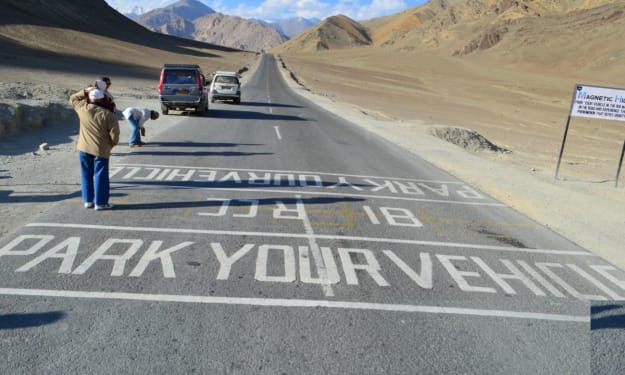Meditations on the Human Condition
Capital Change

The philosophers have only interpreted the world. The point, however, is to change it. Karl Marx
We have been taught to welcome change and embrace its shortcomings because it would eventually benefit us. The theory of evolution also deals with change. It has been proven, repeatedly and unequivocally, that every living creature has been programmed via its genes to evolve towards a better and higher existence. We therefore know, most often told to believe, that we are constantly evolving. However, when we take the time and make the effort to understand the world as it really revolves, we discover our progress to be so costly that it becomes very clear that we have reached a plateau and even triggered devolution.
Our egotistical perspective of the world forever fuels our disrespect of nature. We are destroying nature and all its magnificent creatures including ourselves because we have been blinded by the pursuit of power. We preach that the good of the many outweighs the good of the few or the one, yet in fact, the good of the few always surpasses the good of the many. In our societies, the powerful wealthy are worth more than the powerless poor. Change seems to profit the powerful much more than it does the powerless. For every inch the wealthy yield, the poor lose a foot. For every single dollar the poor grab, the wealthy plunder a billion.
Democracy does not include equality when ruthless capitalism or misguided communism rule the land. Some even argue, and rightly so, that democracy and capitalism cannot coexist. If democracy is seen as a commonwealth system, then the presently dominant form of capitalism is in direct conflict with it. Wealth is not equally distributed or common. On the other hand, if democracy is viewed as the rule of the people, then capitalism in its present incarnation also negates that notion. A minute minority rules the immense majority of people.
Change is overdue, but it is like luck. There is good change and there is bad change. Good change strives to benefit everyone in an equal measure, whereas bad change mostly benefits a so-called elite. Many revolutions have brought change; some of it good but most of it bad. We need a good one; a very good revolution that will ultimately save most current life on the planet. We need a global model that guarantees equality for all. This, of course, seems to oppose natural selection and the survival of the fittest. But being part of nature warrants not only our respect of it, but also, primarily because of our large cerebral cortex, challenging it when its processes seem too harsh. Apparently, we are still the only creatures that can find fault with the natural world and attempt to do something about it. We are also, so it seems, the only ones who can devise plans for saving ourselves from major calamities like storms and earthquakes, or even a global killer like a colliding asteroid.
Equality for All and All for Equality
Had shit been valuable, the poor would have had to be born lacking asses. Latin American saying
Equality for all is often written about, seldom spoken of, but never practiced. All other species that we know of rarely exercise it. For most of us it is therefore only a grand idea. For some of us, however, it is contemptible. Henri Becque said that the defect of equality is that we only desire it with our superiors. Equality for all, means, among other things, equal salaries for all. Neurosurgeons should be earning as much as CEOs and as little as waste collectors, whether their 23rd pair of chromosomes spells XX, XY, or otherwise, and whatever their skin colour or creed. Equality for all also means the disappearance of the wealthy and the poor. Worth and self-worth would become a measure of acquired and developed knowledge. A country’s level of development would therefore be measured according to the Gross Domestic Knowledge (GDK). The more you know, the greater your value. Moreover, equality for all would represent a high standard of living for everyone on this planet; whether one lives in Canada or dwells in Burkina Faso. Furthermore, equality for all means that everyone would be responsible for everyone else. Following orders when committing a crime, or being a witness to a crime without responding properly, will be equivalent to its careful planning. Equality would be applied to our closest relatives as well. The great apes, some of which share 99.3% of our genes, will have to be respected and protected. Fundamentally, equality for all means that envy will chiefly show its cross-eyed demeanour in the presence of more knowledgeable beings. This brand of envy would be, however, quite surmountable. Learning will replace yearning; knowledge will supersede ignorance; and respect will overrule indifference and hatred. While equality for all can be enforced, all for equality is another matter. Not everyone will be in favour, especially in terms of equivalent wages and wealth. All for equality is much more difficult to instil. Many decades will have to go by before the last of the objectors disappears. And even then, history and perhaps even memory, will be present to bring inequality to the stage.
Constructive Competition
Competitiveness has been the hallmark of our success as a species, or so it seems. Ruthlessness is in reality the stamp of our attainment. We stepped on, ran over and crushed everything and everyone who happened to stand in our way, be it a river, a forest, a mountain, a helpless animal, a herd of beasts, an innocent tribe, or a weaker nation. William Graham Sumner said that we throw all our attention on the utterly idle question whether A has done as well as B, when the only question is whether A has done as well as he (or she) could. Competition has to be constructive in lieu of the presently adopted destructive one if we want to survive and capitalism to be just. To succeed does not mean that the competition has to be destroyed. On the contrary, obliterating the competition monopolizes the market, relaxes potential ambitions, and creates acute inequality. Daniel C. Dennett recounts Thomas Hobbes’s account of the advent of civilization:
One day, when yet another conflict arose, just like all the others that had come before it, something new happened to happen. Instead of persisting in the myopically selfish policies of mutual defection and distrust that had reigned heretofore, these particular lucky competitors hit upon a new idea: cooperation for mutual benefit. They formed a social contract. (Dennett, 454)
We need a new brand of capitalism: Credit Capitalism. When you create something, you are credited with it, and anyone who uses your creation, adds to your credit. The level of credit that one reaches measures one’s success. The more credit one possesses, the more honour one acquires and the more respected and respectable one becomes. Since everyone in a company or corporation earns the same amount of money (as you), as in all other businesses, you all share the credit equally. Knowledge determines one’s position in an organization. One whose knowledge is balanced: who possesses both acquired and developed knowledge, both learned and authored knowledge, could aspire to a top position whose sole merit would be its honorary status. For example, an individual (or a corporation) who invents a way to harness cold fusion, thus solving humanity’s growing dilemma with the use of fossil fuels, will see his, her, or its credit reach an astronomical level, since every region of the world will be using this blessed discovery. Currency will still be used to exchange goods, but its value will be tied to the country’s GDK. Financial markets will still trade shares and the public will still be able to invest in these supply-and-demand swap-meets, but all transactions will represent the advancement of knowledge: knowledge for the betterment of humanity as well as other life forms. Competition will still subsist. However, a competitor’s ultimate goal will not be the eradication of all other competitors and the never-ending accumulation of capital. Instead, honour through credit will animate all competitive undertakings. To be honourable will not connote only one’s honesty but also one’s labour for the overall advancement and improvement of knowledge.
Work and Welfare
It has been said and repeated that the world continues to exist due to morality, work and charity. No wonder that our world is in deep disarray. Our morality is lacking in intensity and is often hypocritical; work is mostly monotonous, non-existent for many, and enslaving to a myriad more; and charity is scarce and practically uncharitable. James M. Barrie said that nothing is really work unless you would rather be doing something else. Most of us dream of doing something else. When it comes to work, fiction is often better than reality. We tend to imagine the perfect job. Some of us attempt to get it, but very few of us enjoy it once we are doing it since it is never exactly what we imagined it to be. It is rarely greener on the other side of the fence; it is often just different. Work is generally equated with wellbeing (another word for welfare). But welfare has to be all-encompassing to stand for what it really is. One cannot delight in life when the welfare of many can only be measured in terms of toil and moil. Jean-Jacques Rousseau said that it is too difficult to think nobly when one thinks only of earning a living. But we must think nobly whatever our occupation may be. If we all demand work for all, welfare will only exist for the professionally challenged. The only thing we should be giving away is knowledge. Education should therefore be free for all. But why would someone wish to become a waste collector? What incentive could we offer when all salaries are equal? If, like any other job, waste gathering is regarded as dignified and its importance in the circle of life is aptly stressed, there will be enough people willing to carry it out.
Benevolent Bureaucracy
The 20th century will be remembered for many things, and according to Carl Sagan, “…for three broad innovations: unprecedented means to save, prolong and enhance life; unprecedented means to destroy life including for the first time putting our global civilization at risk; and unprecedented insights into the nature of ourselves and the Universe.” (Sagan, 204)
The 20th century will surely be remembered as well for the ubiquitous webbing of bureaucracy and the way in which its mechanical behaviour turned its human factor into series of inhuman submachines that lost their capacity to think for themselves. It is quite clear that bureaucracy dehumanizes us, making us feel Lilliputian before its towering disposition. Franz Kafka who wrote extensively about its effects on our psyche said that every revolution evaporates and leaves behind only the slime of a new bureaucracy. We need a benevolent bureaucracy; one that will help us grow; not one that will make us smaller with each passing mandate. This new brand of bureaucracy will have a smiling face, a warm manner, and a congenial attitude. Its main purpose will be to assist us; not to brush us away whenever the system is down or the question too complicated. Crucial meetings will become public domain, and every decision will involve as many people as possible. Government will not be ruled indirectly by corporations, but by knowledge-for-global-betterment-seeking individuals. A benevolent bureaucracy will facilitate people’s lives through bipedal parallel processing (human interaction) and a right-away-Jack-or-Jill approach (swift service). It will ensure that procedures always come after people.
Capitalism and Population
Karl Marx theorized that: “What experience shows to the capitalist generally is a constant excess of population, i.e., an excess in relation to the momentary requirements of surplus-labor-absorbing capital, although this excess is made up of generations of human beings stunted, short-lived, swiftly replacing each other, plucked, so to say, before maturity.” (Marx, 150)
Capitalism could have been less aggressive and less pervasive had world population remained more stable in its augmentation, and global respect for human (and other animal) rights been enforced. With less people to exploit and the labour market being more valuable, and with human (and other animal) rights highlighting every agenda, capitalism could have been much tamer than it is at present. Technology would have probably still advanced to its present level, but without most of the inequality with which it is distributed. At almost eight billion people and still counting, our world has already greatly surpassed its capacity to sustain us all at the level that we in the West have been accustomed to. Unless population growth is curbed through education and the elimination of poverty, a dire future will await most of us and especially our offspring. A knowledge-based economy rooted in credit capitalism could solve this imminent dilemma. Frank Zappa said that it gets harder the more you know, since the more you find out the uglier everything seems. No wonder that the so-called elite wishes to keep us in the dark. They want to protect us from all the ugliness they have created. In fact, one could say that it is so ugly out there that we ourselves are as ugly. After all, we are supposed to be the most adaptable species. We therefore adapted as well to all the ugliness that surrounds us. Knowledge for knowledge’s sake could help us bring back all the beauty that has been lost.
Secular Civilization
What means does civilization employ in order to inhibit the aggressiveness which opposes it, to make it harmless, to get rid of it, perhaps? …aggressiveness is introjected, internalized; it is…sent back to where it came from. (Freud, 756)
We live in a sick society because we are all sick. Of course, some of us are sicker than others. Yet, the general picture is that of an ailing and ill-fated society. Since World War II, there had been only three days of peace in the world, and the balance sheet prior to WW2 is not significantly better. We are aggressive like all other animals. However, the scope of our aggressiveness is unparalleled in all other species. We kill for pleasure and exterminate, with innocent people and other creatures being most often the victims of our wrath. Killing has become an art form. We have been desensitized, whether the killing is done slowly or swiftly. We speak of wild animals and their taming, when we are the wild bunch in need of docility. Civilization was supposedly created to civilize us. Apparently, it had done so, but at a price. Our primordial instincts have been unsuccessfully repressed, exploding haphazardly into existence with a power never seen before. Our innate sense of community has been shattered as well, when the size of the group boundlessly increased. Civilization has also popularized religion. The personal fear of the unknown was transformed into a collective anxiety verging on panic. However, the advent of science did not soothe everyone’s apprehensions. Religion, through centuries of indoctrination, clawed its paws into our psyche. In the hands of a few men, it conquered the world. According to Marx, religion is the opium of the people, blinding them to the deep-seated inequalities and stifling their creative energies. Civilization needs to be secularized. As long as people believe in an external supernatural force or internal divine power, they are unable to perceive the other possibilities that exist beyond their ideologies. We need to grow up. But you get nothing for nothing, they say. All of us are assholes, but some of us are more than one, some (or one) also declare. We have been civilized all right, modernized, socialized, globalized and mechanized — batteries not always included. One could declare it to be a sad state of affairs. Another could say it is as it was supposed to be. And yet another, perhaps more enlightened, like H. C. Bailey, could proclaim: The origin of civilization is man’s determination to do nothing for himself which he can get done for him.
References
Dennett, D.C. (1995). Darwin’s Dangerous Idea: Evolution and the Meanings of Life. New York: Touchstone.
Freud, S. (1989). “Civilization and Its Discontents.” In P. Gay, ed., The Freud Reader (pp. 722-772). New York: W.W. Norton & Company.
Marx, K. (1959). “Excerpts from Capital: A Critique of Political Economy.” In L.S. Feuer, ed., Marx & Engels: Basic Writings on Politics & Philosophy (pp. 133-167). New York: Anchor Books.
Sagan, C. (1997). Billions and Billions: Thoughts on Life and Death at the Brink of the Millennium. New York: Random House.
About the Creator
Patrick M. Ohana
A medical writer who reads and writes fiction and some nonfiction, although the latter may appear at times like the former. Most of my pieces (over 2,200) are or will be available on Shakespeare's Shoes.






Comments
There are no comments for this story
Be the first to respond and start the conversation.